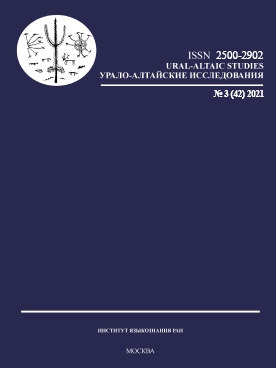ОТРИЦАТЕЛЬНАЯ ЭКЗИСТЕНЦИАЛЬНАЯ КОНСТРУКЦИЯ С ĀЧИН В ЭВЕНКИЙСКОМ ЯЗЫКЕ: ВНУТРЕННЯЯ СИНТАКСИЧЕСКАЯ СТРУКТУРА
NEGATIVE EXISTENTIAL CONSTRUCTION WITH ĀČIN IN EVENKI: THE INTERNAL SYNTACTIC STRUCTURE
Author(s): Elena L. RudnitskayaSubject(s): Theoretical Linguistics, Morphology, Syntax, Phraseology
Published by: Институт языкознания Российской академии наук
Keywords: existential negation; Evenki; oral language; written texts; grammatical features; formal-syntactic analysis; partitive; nominative; small clause;
Summary/Abstract: In the paper, the Evenki negative existential construction with āčin is considered. The analysis is based on the use of this construction in the 21st century’s oral and written texts. The grammatical features of āčin are considered. In a finite clause, āčin agrees in number with the subject, and it cannot attach tense affixes. With these features as central for its 21st century use, we analyze āčin as a predicative adjective. Importantly, the āčin construction is not used in the noun modifier function in the 21st century Evenki. We propose that āčin is the head of a predicative adjective phrase (AdjPredP). The derivations of constructions with the nominative [NOM] and the partitive [PART] of missing object are compared. In the partitive object construction, the group [NP [PART] + āčin] is the predicate, and the subject is normally the possessor. The formal analysis of both cases is based on the assumption that [NP + āčin] is a small clause (SCi). This analysis accounts for the agreement patterns of āčin, and it includes the mechanisms of the nominative vs. partitive case assignment. In the adverbial use, there is a distinction between oral and written language. In the written language (that is close to the literary language), āčin has morphological properties of a noun (it can attach case and possessive affixes), and it is similar to the nominal head of a quasipossessive construction. In the oral language, the predicative adjective āčin construction [NP [PART] + āčin] is used primarily in the adverbial function. This and other oral speech innovations that create additional problems for the proposed formal analysis are discussed.
Journal: Урало-алтайские исследования
- Issue Year: 2021
- Issue No: 03 (42)
- Page Range: 60-75
- Page Count: 16
- Language: Russian

